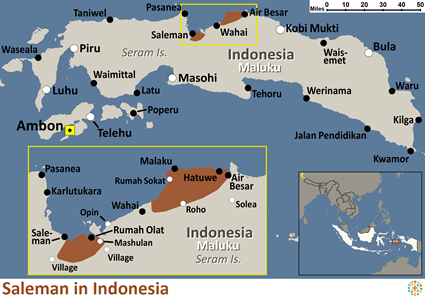The Saleman people live in Indonesia, primarily in the Maluku Islands. Their history reflects a long connection with the sea, as they have traditionally lived along the coastlines and relied on fishing as their main source of livelihood. The Saleman have a history of trade and interaction with neighboring communities, which has influenced their social and cultural practices. Over the centuries, they have adapted to various external influences, including the spread of Islam and the arrival of traders from other regions.
The Saleman people primarily engage in fishing, agriculture and small-scale trade. Fishing remains central to their economy, with men often spending long hours at sea while women engage in processing and selling the catch. In addition to fishing, they cultivate crops such as sago, coconut and vegetables which supplement their diet. The Saleman live in coastal villages composed of wooden houses, often built on stilts to protect against flooding. Community life is closely knit, with strong ties to family and local traditions. Education is increasingly valued, but access to quality schools remains uneven, particularly in more remote areas.
The majority of the Saleman people practice Islam, which plays a significant role in their daily lives. Islamic practices, such as daily prayers and observance of religious festivals, are widely followed within the community. At the same time, elements of traditional beliefs, including animism, persist, especially in rituals related to the sea and the natural environment. These traditional practices coexist with Islamic customs, reflecting the community's history of adaptation and cultural integration.
The Saleman people face challenges related to economic development, healthcare and infrastructure. Many rely on subsistence fishing and agriculture, with limited opportunities for alternative livelihoods. Healthcare services are often inadequate, particularly in more isolated areas, leading to high rates of preventable diseases. Access to education is improving, but many children still can't attend school because of economic and logistical barriers. Infrastructure improvements, such as better transportation and clean water supply, are needed to support the community's growth and development. Efforts that focus on sustainable fishing practices, healthcare access, and educational opportunities are crucial for the long-term well-being of the Saleman people.
Pray for a "Book of Acts" type of movement to Christ among the Saleman people of Indonesia.
Pray for the Saleman people to understand and embrace that Jesus wants to bless their families and neighborhoods.
Pray for Holy Spirit anointed believers from the Saleman people to change their society from within.
Pray for a movement in which the Holy Spirit leads and empowers disciples to make more disciples.
Pray for a movement of Jesus to heal and strengthen Saleman communities.
Scripture Prayers for the Saleman, Hatue in Indonesia.
Joshua Project. (2023). Saleman People of Indonesia. Retrieved from joshuaproject.net
Maluku Cultural Foundation. (2023). Ethnographic Overview of the Saleman People. Retrieved from malukuculturalfoundation.org
UNDP Indonesia. (2023). Developmen
| Profile Source: Joshua Project |

























